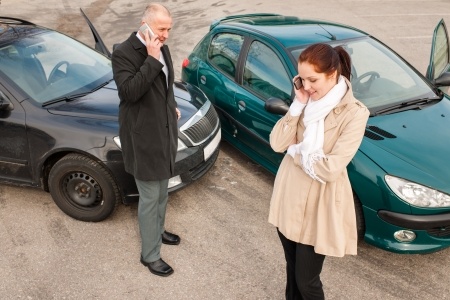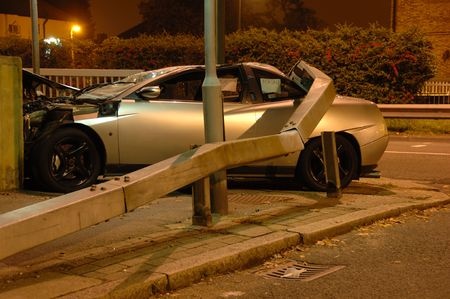If you’ve ever been in a car accident you know what a hassle it can be just dealing with your own insurance company. But if the accident isn’t your fault, just think what you’ll be dealing with when it comes to the insurance company of the stranger who plowed into your car.
Here are a few tips to help you file a claim with the other party’s insurer, which would be a third-party claim:
Get complete information
Whoever caused the accident is supposed to report it to their auto insurance company. But, sometimes they’re reluctant to do so. To play it safe, you should also call their insurance company and advise them of the accident.
To do this you are going to need the other driver’s complete information, which you should gather at the scene of the accident. This is what you should get:
- Name and address of the other driver
- The name of the other driver’s insurance carrier and policy information
- If there are witnesses, get statements from them as well as contact information
- Take photos of the scene of the accident using your smartphone
This is the evidence you will need to substantiate your position on who caused the accident. Some auto insurance companies have mobile apps that help motorists document an accident on the scene right after it occurs. Some of these apps provide a checklist telling you how to gather the information for your claim with them or the other driver’s insurer.
Furthermore, there is a free smartphone app called WreckCheck provided by the National Association of Insurance Commissioners that can help gather the information you need and provide yours to the other driver.

Make the proper notifications
Take it upon yourself to notify the other driver’s insurance carrier that there has been an accident involving one of their policyholders and that you were involved as well. Just give them the facts of what happened, even if you are convinced the other driver was at fault.
It is up to the police to decide who was at fault and whether they should issue a ticket. On their own, the insurance company will make their own determination as to who was at fault. This might or might not agree with the assessment made by law enforcement. In making their determination, the insurance company will consider the police report and statements from the drivers and any witnesses as well as physical evidence.
Even if you think you were not the cause of the accident, it is always best to call your insurance company to inform them of the accident. This shows good faith on your part and this will help you if the other driver’s insurance carrier denies that their policyholder was responsible for the accident, in which case you would need to file a collision claim.
In theory, you should just need to notify the other driver’s insurance company of your damages plus any injuries, tow your car to the body shop, see a doctor and just wait for the insurance company to pay these bills.
Unfortunately, this doesn’t always play out as it should. Auto insurance companies often insist that you get their authorization for any car repairs and medical treatments. If their insurance adjuster does not give authorization for your car repair before it’s taken to the body shop, there can be a problem. At the very least, make sure that the insurance carrier has already accepted liability before you start having your car repaired. Get them to email all of this to you so you have their authorization in writing.
You need to know that no insurance company can demand that you take your car to a certain repair shop. Most states allow insurance companies to recommend car repair shops, but they are not legally allowed to insist that you use the auto body shop they name. It is your choice.
You may need an attorney
The other driver’s insurance company may tell you to have your own insurance company pay for the repairs, claiming they have no reason to believe their policyholder was at fault. While there are laws in most states that make it illegal for an insurance carrier to deny a claim without making a reasonable effort to investigate the facts, or to deny a claim when it is reasonably clear that they are liable, it may not be easy to fight with the other driver’s insurance company.

You may choose to file a claim with your own insurance company and they might very well decide to fight it out with the other insurance carrier for compensation if they determine the other driver caused the accident.
If you do decide to fight with the at-fault driver’s insurance company by yourself, you’ll need a good lawyer, especially if you have serious injuries. Your attorney will help you understand and navigate the insurance laws.
You may have even collected evidence that proves the other driver was at fault, he may have even admitted this at the scene, but your claim is still denied by his insurance company. How can this be? Because he may very well have told them a different version of what caused the accident that does not fit with your version of events. His insurance company may prefer to believe him just to get out of paying your claim.
The truth is that sometimes the insurance carrier will side with their policyholder, even when their version of events conflicts with the police report.
It is not at all usual for an insurance company to side with their policyholder when there is no accident report by the police and it’s not clear who is at fault. In many states, the officer that shows up at the scene of an accident may look at the damage and determine that it’s only minor (usually under $500), and the officer won’t file any accident report. Estimates by body shops for that same damage can total in the thousands. You need to take your car yourself to a reputable repair shop in order to get an accurate determination of the extent of your car’s damage.
If the damage won’t cost a whole lot to repair, you can always file a case in small claims court against the other driver. Insurance companies are well aware that the longer they can drag out a claim, the more apt you are to cave and settle for less or just go away.
If you’re getting nowhere, turn to your insurance carrier
Even though you did not cause the accident, you can still file an accident claim with your own insurance company if you have this sort of coverage. The claim would be for them to pay for your damages and injuries.
You can do this if you are adequately covered with collision insurance. In this case your insurance company would pay for the repairs on your car or compensate you if your car is a total loss. If you decide to do this, you would still be responsible for paying the deductible towards the repairs. But, you may actually get that amount of money back if your insurance company ends up settling with the at-fault driver’s insurance carrier.
If the other driver has no car insurance and you have what’s called “Uninsured Motorist Property Damage” or UMPD coverage, you can file a claim with your insurance for the damage to your car. On UMPD claims you do not have to pay any deductible.
If an accident is not your fault and you are forced to file a claim with your insurance company, this does not necessarily mean that your insurance rates will go up.
There are laws in most states prohibiting insurance carriers from surcharging or raising their policyholders’ premiums for accidents that were not their fault. Unfortunately, these laws won’t stop your insurer from dropping you when it comes time to renew your policy if you’ve filed a slew of recent claims.
Understand your coverage for injuries
In most states, if you sustained injuries in a car accident in which you were not at fault, you would file your injury claim through the other driver’s insurance company. If they do not have any car insurance, you could file a claim under your coverage for Uninsured Motorist Bodily Injury, but only if you are covered for this. You could also file a claim with your health insurance provider.

Do not pay too much for a rental car
Insurance companies naturally look for ways to cut costs, and saving money on reimbursing policyholders for the cost of a car rental is an easy target.
They do this by advising accident victims that they’ll only pay so much per day for a car rental. If you’ve been the victim of another driver’s negligence, you do have rights when it comes to recouping the costs involved in resolving the disruption in your life, and this includes the cost of a rental car while yours is being repaired.
If you rent reasonably you can avoid paying a portion of those costs. Do not buy a collision damage waiver if your rental company offers this because you are covered under your own insurance policy for any damage to a rental car.
If you rent a car at a reasonable price and your insurance company tries to short-change you somehow on the reimbursement, ask them to put their reason in writing. Insurance companies must advise you in writing when they decide to deny or somehow reduce payments to their policyholders.
Know what you are entitled to
It would be very helpful for you to become familiar with the prompt-payment law in your state. Every state has an Unfair Claims Settlement Practices Act that spells out the how long an insurance company can take to give you a check to cover your damages.
One thing to consider: Unfair Claims Settlement Practices Acts very often do not give you the same rights if you are filing a claim against the other driver’s insurance company as opposed to filing your claim with your own insurance company. Check out California’s Fair Claims Settlements Practices Regulations to find out more.
Sending a factual letter off to the at-fault drivers insurance carrier would be the best way to advise them of what you expect, letting them know that you know your rights. In the letter you would tell the insurance company that you expect them to cover all reasonable costs incurred by you due to the accident. This would include them paying for car repairs or the car’s total-loss value, diminished value, lost wages, medical expenses, pain and suffering plus the cost of renting a car. All of this points out the insurance company’s responsibilities according to public policy.
Keep detailed records and copies of all correspondence. Make a note of the dates and times you speak to customer service reps as well as their names.
If you or a loved one has been the victim of motor vehicle negligence and would like to speak with an Automobile Accident Attorney, please contact us at O’Connor, Runckel & O’Malley LLP. We are here to answer your questions and discuss how to protect your legal rights.
(Source)
Published on behalf of O’Connor, Runckel & O’Malley LLP. The information presented in this article is not legal advice, is not to be acted on as such, may not be current and is subject to change without notice.

